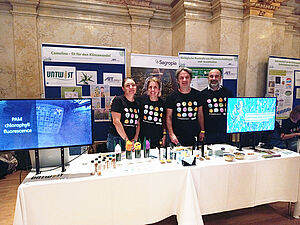Around eight hours of hands-on science: At the Research Festival Lower Austria on 10 October, more than 80 stations turned Palais Niederösterreich in Vienna into an open laboratory. The Competence Unit Bioresources of the AIT Center for Health and Bioresources focused on two topics that concern agriculture and society alike: nature-based crop protection strategies and the question of how crops can better withstand heat and drought.
European agriculture is under double pressure. Stricter regulations in plant protection and increasing resistance limit the use of chemical agents, while climate change effects such as heatwaves and longer dry periods increase the risk of crop failures. Research institutions are therefore working on approaches that reduce environmental impacts and stabilize yields—practical and scalable.
The AIT stations at a glance
- Biological control of plant pests and diseases with the projects SAGROPIA and BIOVEXO. https://biovexo.eu/ & https://sagropia.eu/
At the AIT booth, concrete approaches were presented showing how biological solutions, microorganisms and nature-based preparations can curb pests and vectors of disease-transmitting insects—from potatoes and sugar beets to olive and almond crops. Visitors saw how modes of action are tested and evaluated in field studies and the role that data quality and transferability play in the EU projects. “Biological methods come into play where chemical agents reach their limits—they are targeted, combinable and can reduce environmental impacts. What matters is that they work in the field and can be integrated into existing farming systems,” says Stephane Compant, AIT Bioresources expert and project leader of BIOVEXO. - Camelina—fit for climate change with the project UNTWIST. https://untwist.eu/
The second station used Camelina (false flax), a traditional native crop, to show how plants respond metabolically and physiologically to water and heat stress. Experiments and visualizations explained which traits increase stress resilience and how these findings can feed into breeding and cultivation—with a view to robust yields under variable climate conditions.
The AIT contributions show where the expertise comes from: from long-term EU projects, teamwork across disciplines and testing from the laboratory to the greenhouse to the field. The next step is to roll out proven biological protection methods more widely in European growing regions—such as for olives and almonds—and to channel insights into plant resilience specifically into breeding and advisory services. For practice, this means more effective, environmentally friendly options in crop protection and more reliable decisions in increasingly changeable weather.
The Lower Austria Science Festival 2025: https://www.noe.gv.at/noe/wissenschaft-forschung/forschungsfest_noe.html



